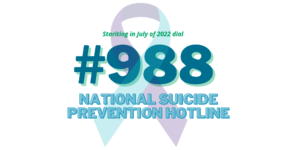Too Many States Aren’t Ready to Launch 988, the New National Crisis and Suicide Prevention Hotline
 In less than six months, a new mental health crisis and suicide prevention number, 988, will go live nationwide. This new tool could provide people in crisis with a number to access trained counselors who can help immediately. But right now, most states are not as prepared as they should be. Unless states act now, the current patchwork of crisis response numbers and hotlines could get even more complicated, which means that states may not be able to provide support to everyone as the law intended.
In less than six months, a new mental health crisis and suicide prevention number, 988, will go live nationwide. This new tool could provide people in crisis with a number to access trained counselors who can help immediately. But right now, most states are not as prepared as they should be. Unless states act now, the current patchwork of crisis response numbers and hotlines could get even more complicated, which means that states may not be able to provide support to everyone as the law intended.
In 2020, Congress passed the National Suicide Hotline Designation Act. It requires every state to set up by July 16, 2022, a 988 call system to make it easier for people to seek immediate support for mental health or substance use crises. The system is meant to serve as a complement to 911. And if states set it up to do so, 988 could divert calls from law enforcement to staff that are trained to respond to mental health and substance use emergencies.
Though the law has gotten very little attention, the creation of a dedicated line separate from 911 could be a critical tool in our ongoing efforts to address racial bias in policing, police violence, and our mental health and substance abuse crises -- if handled appropriately. More than 20% of all people killed by police were confirmed to be suffering from acute mental illness and police kill Black people at twice the rate of Whites, according to Washington Post data. And data shows a similar proportion of all calls to police involve someone who is in crisis.
Right now, too few states are ready to roll out 988. Nine states have passed 988 legislation to strengthen crisis response infrastructure, and California included resources to support 988 in this year’s budget without passing separate legislation. Some states like Georgia and Arizona are already recognized national leaders in crisis response and 911 alternatives. States including Colorado, Maryland, and Washington State have set themselves up to hit the ground running in July by strengthening existing statewide crisis systems and identifying gaps that will need to be addressed to deliver the best possible support under 988.
But setting up systems is only one part of the equation. States must think holistically about creating processes and procedures to coordinate 988 calls with local services and ensure that callers with the most severe mental health needs don’t fall through the cracks. And this is an area where every state could do more.
In our work with governments at Third Sector, we see that the good intentions that policymakers have when passing a law like this can be thwarted by inefficient or inequitable implementation.
Take, for instance, Washington State, which passed its own law last April to develop a statewide crisis response system that provides culturally and linguistically competent services for people in crisis. In a systemwide assessment we conducted for the state last year, we found that while Washington has fairly robust systems and tools to support 988, its case management and record-keeping systems are fragmented in ways that make it hard to truly assess what happens to people after they receive crisis support. It’s critical that our systems are set up to save lives, but more than that, they should be set up to provide people with resources and care they need that could help to prevent crises.
Because Washington got a head start, it's in a better position to address this potential gap. But far too many states haven’t gotten started at all in setting up systems for 988, let alone working to ensure those systems work for everyone. And that means that the nationwide 988 number’s chances of being the game changer that it could be are in serious jeopardy.
Good policy matters, but its promise can only be fulfilled through smart, equitable implementation. State legislatures must use their power to ensure there are sufficient funds for implementation and the relevant state agencies must move quickly to put in place systems that ensure that the promise of 988 is met for everyone in America, regardless of race, circumstance, or geography. Time is running out.
